10 Reasons I’m Cautiously Optimistic About a Harris Victory
With less than seven weeks left until Election Day, we all could use a bit of reassurance.
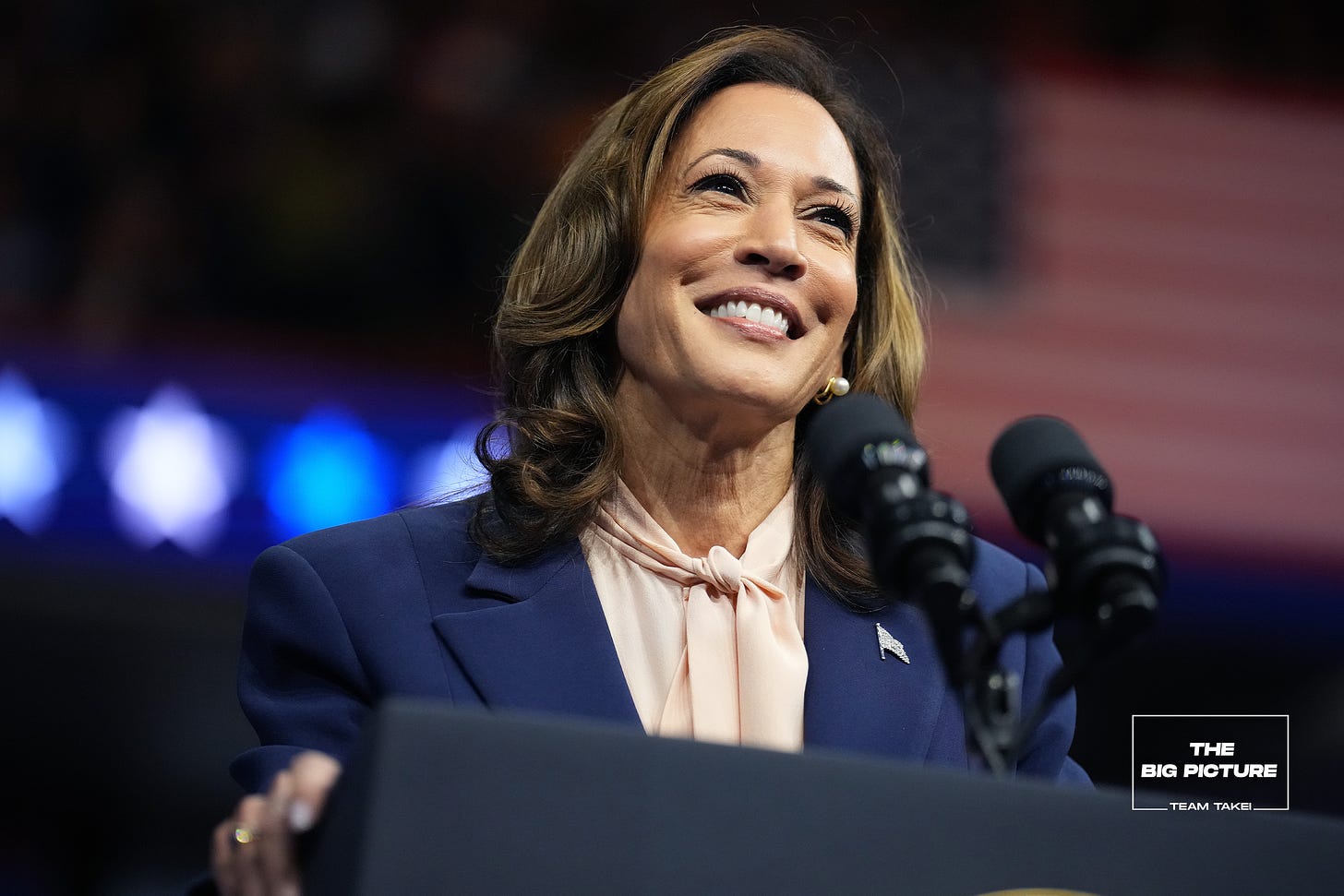
Back in May, I wrote a piece explaining why, despite some gloomy poll numbers, I remained cautiously optimistic about the Democrats’ chances of holding on to the White House and stopping Donald Trump from being elected to a second term.
It’s funny how a bad debate stumble, an assassination attempt, a surprise withdrawal from the race by Biden, and a triumphant entry into the race by Kamala Harris, who then proceeded to trounce Trump in the next debate, can change things. I am more optimistic than ever, though still somewhat cautiously so, that the Democratic ticket will prevail in November. So I wanted to share ten of my reasons for that guarded optimism.
First, some caveats. This is still a very close race, and a lot can happen in seven weeks. If 2024 has taught us anything, it is that things are rather unpredictable lately in American politics. The race is already turning ugly, with chaos erupting from Trump’s and Vance’s attacks upon Haitian immigrants in Springfield, Ohio. We’ve recently seen a second would-be assassin pop up. And even if we win, which I think is now somewhat more likely than not, we still face a murky post-election period before the final certification of the votes. Trump and his followers almost certainly will not accept any loss with grace.
That said, there are good reasons to forge ahead with guarded optimism and to have some assurance that things are currently on a good path. Here are ten such reasons, in no particular order.
The Biden coalition is reassembling under Harris
While Biden was still in the race, the polling was telling us consistently that young people and minorities had soured on Biden. Part of that could have been due to a difficulty in polling large enough samples of such voters, but a good deal of it was that these voters simply didn’t want to see a repeat of 2020 and that Biden seemed, fairly or not, too old to do the job.
Added to that fact was the economy. The recovery was uneven, and, as Judd Legum noted, based on a new government report, the lowest 20 percent wage earners had been hardest hit economically by the pandemic and its aftereffects, with high grocery and gas prices eating into their disposable income. Going back to the Trump years (at least before the pandemic) seemed like a way out of their pain for many of these voters, even though they disliked Trump personally.
When Harris entered the race in Biden’s place, a large number of these voters began to come back to the Democratic fold. Among the “double haters”—those who disliked both Biden and Trump—Harris offered a new option, and many took it. She began to win this group by a substantial margin. Now, the traditional Democratic base of young people, minorities, women, and LGBTQ voters has started to look like the one that garnered 81 million votes for Biden in 2020. If Harris can continue to consolidate this group, especially Latino voters, her chances of winning go way up.
Voter enthusiasm favors Dems
While polls of registered voters show a very close race, polls of likely voters have trended toward Harris. Indeed, they even tended to favor Biden back in June. But Biden had a problem that Harris has now solved: For months, the Democratic base was dispirited and lagged the GOP when asked about their enthusiasm to cast a vote. When Harris stepped in, however, that number turned around and now exceeds the GOP’s enthusiasm rating for the first time this election, according to polling by Gallup.
Democratic enthusiasm has led to surprising victories on the question of abortion rights when put to the voters in places like Kansas and Ohio. It has led to Democrats beating expectations in nearly every special election since the Dobbs decision came down in June of 2022.
But will it keep up? Early indications are positive. Enthusiasm can be polled, but it can also be derived indirectly from individual donations, volunteer counts, and voter registration. All of these indicators point toward Harris having some real momentum, and all of these factors translate into turnout in the election.
Abortion remains a big driver
The question of abortion rights is not only driving voter registration, it is also helping to forge a gender gap that we’ve not seen before. A recent poll in the critical swing state of Pennsylvania by Suffolk University found a gender gap in the high teens, with women favoring Harris by 17 points—a number never before seen. That’s far bigger than the eight-point gender gap of men favoring Trump in the state.
Harris has long been a solid messenger on abortion rights, and she has honed her attacks on Trump well. This put him on his back foot during the debate, and he has not yet found a solid response. As compelling and horrific stories begin to emerge about women in red states dying because of draconian abortion bans, this issue could rise in importance, especially among younger minority women who have yet to engage in the election.
Furthermore, two key battleground states, Arizona and Nevada, have abortion rights amendments on the ballot. This is expected to increase turnout in these key states. A Harris win in Arizona in particular would foreclose many possible paths to 270 Electoral College votes for Trump.
Extremists on the ballot in key swing states
In the 2022 midterms, the appearance of MAGA-aligned candidates and election-denying extremists helped drive moderate voters away from the GOP, leading to wins across the board for the Democrats in key battleground races. And the same thing is happening in key swing states in 2024.
In North Carolina, the radical extremist GOP Lt. Governor Mark Robinson is at the top of the gubernatorial ticket. He is badly trailing his Democratic challenger, state Attorney General Josh Stein, in many polls by double digits. There could be a strong “reverse coattail” effect in the state, as Democrats and independents turn out to reject Robinson and while they’re at it cast a vote for Harris/Walz. The presidential polls are currently tied in North Carolina, so the GOP is very worried about this possibility.
The same goes for Arizona and its senate race, where extremist election denier Kari Lake’s name will appear in a race against Democratic Rep. Ruben Gallego. Lake, who is a Trump lackey, lost her race for governor in 2022 and has spent the last two years challenging the results. She is also trailing Gallego badly in the polls, and Arizona voters may turn out to make sure she is not their senator while casting a vote for Harris/Walz.
The economy is on solid footing
As I discussed back in May, going into the election it wasn’t clear whether we would avoid a recession via a “soft landing,” with inflation tamed without having to see high unemployment. Now it appears clear that the U.S. has achieved this even while other nations have struggled. Inflation is back to more or less normal levels; unemployment remains at historic lows; manufacturing is booming; and finally, as of yesterday, interest rates have begun to come down.
It may seem unfair to Joe Biden, but the biggest beneficiary of all this is Kamala Harris. She is now even with or even ahead of Trump in some of the latest polling on who is better trusted on the economy, which remains voters’ top concern. A recent Financial Times survey, for example, put Harris ahead of Trump for the first time on this question.
Gas and grocery prices are coming down, too, leaving more money in the hands of voters with less than seven weeks to go. Meanwhile, the Dow Jones is hitting record highs, giving millions with 401Ks an added sense of increased wealth.
Harris walks a careful line on the economy, touting the administration’s success in creating a record 16 million jobs including 800,000 manufacturing jobs, all while acknowledging that the cost of groceries remains high and they still have work to do. But Trump is having trouble articulating his economic vision other than an imposition of tariffs, which nearly all economists agree would aggravate inflation rather than ameliorate it.
Likability factor favors Harris
Given her low approval ratings before she became the presumptive Democratic nominee, it was surprising to many to see Harris enjoy a surge in popularity. Her entry into the race became a cultural moment, replete with memes, remixes, and celebrity endorsements. She began to fill stadiums, where the energy was off the charts. And she began to tell her story, which most voters had never heard.
All that has caused something uniquely remarkable in political history: a candidate with low favorables suddenly rising into positive territory. People seem to actually like Harris. In fact, the more they learn about her, the more they like her.
Meanwhile, Trump is stuck at low favorability, hovering at or below 40 percent in most surveys.
This “vibe” matters a lot given who remains to be “gotten” in this race. Many of the undecideds, who haven’t been paying attention to the candidates’ policy positions, the headlines, the economic numbers, or really much of anything having to do with the election, will make up their minds based on how they feel going into the voting booth. And if they decide they like Harris and still dislike Trump, they will probably break her way.
Polling momentum favors Harris with little to change it
Polls are tricky things. Individually they can’t give us more than a small fuzzy snapshot of a specific point in time, one that could be way off from final results. Collectively, they can give us a slightly clearer picture, but they still could be way off, just as they were in 2016 and 2020.
In those races, Trump’s support was badly underestimated by the pollsters, and we all still have trauma from that miss. But in 2022 and in the 2024 primaries, support for the GOP was overestimated by the polling, sometimes by a lot.
What the polls can tell us, however, is the general direction things are going. It is unmistakable that Harris’s numbers continue to improve while Trump’s remain lackluster, and that is generally a big problem for Trump. Here is the presidential poll tracker by The Economist.
I agree with The Nation’s Jeet Heer, who tweeted that the hurdle for Trump has everything to do with time left on the clock and few opportunities to reverse this momentum:
The big problem for Trump is not just that Harris has a lead but also there aren't many ways in [the] remaining 48 days to change [the] dynamics of race. Conventions are over, Trump doesn't want to do debates, attacks on Harris/Walz aren't sticking, the xenophobia isn't working.
Harris has defined herself as the change candidate
It takes an incredible feat of political jujitsu for a vice president of the current administration to cast herself as the candidate of change. Harris has the benefit of running against Trump, however, giving her built-in rallying cries such as, “We’re not going back!” and “Turn the Page!” along with thematic slogans like “A New Way Forward.”
She has also been far more disciplined than Trump (I know, a low bar) when talking about the future she envisions under her administration. Trump, on the other hand, is bent on rehashing old grievances and coming after his political enemies, all while turning Americans against each other.
U.S. voters are hungry for something new and are feeling exhausted by that very division. Harris is the candidate who offers a way forward and out of the morass. By picking an optimistic, plain-spoken Vice Presidential running mate with rural roots, Harris has also signaled that she wants to reach across the urban/rural divide. Gov. Tim Walz has been a perfect messenger here, especially contrasted to the dark, angry, and hate-filled rhetoric coming from Sen. JD Vance.
The GOP has fractured
The primaries revealed that many GOP voters—as much as a quarter of them in key swing state counties—preferred Nikki Haley to Trump. Many of the “Haley” voters aren’t coming back to vote for Trump, and a statistically significant number are considering crossing over for the first time to vote for Harris.
This is no easy decision for voters who have been Republicans for all of their adult lives. But they now have a permission structure to cast such a vote for Harris. There are former respected elected officials, such as Liz Cheney and Adam Kinzinger, who have decided to publicly back Harris. And as recently as yesterday, 111 former top Republican national security officials issued an endorsement of Harris, something wholly unprecedented in an election.
Meanwhile, the GOP continues to fracture from within, with several high-profile leadership fights within state parties in important swing states such as Michigan, Georgia, Nevada, and Arizona. A party so divided will have a much harder time mobilizing on the ground.
By contrast, the Democratic Party is united and energized at levels not seen since Obama’s victory in 2008.
Trump has failed to expand his appeal
The math of the election reminds us that in order for Trump to win in 2024 after losing in 2020, he had to pick up new votes in key battleground states. But he faced a problem. His most solid support came from older white voters in those states, but many of them have since passed away, either from Covid or from other causes. Meanwhile, millions of new, younger voters who are far more likely to vote Democratic have come of age.
That gave Trump two basic choices. He had to try to reach more middle-of-the-road independents, or he had to find some other way to build on his existing MAGA base. Since leaving office he has only driven more of the centrist voters away, especially after his attempt to overthrow our democracy on January 6 and his multiple criminal indictments.
Understanding that he doesn’t stand much of a chance with these voters, Trump has instead leaned hard into convincing younger male voters, especially young men of color, that they should vote for him. To some extent, he has been successful, as Democratic support especially from young Latino men remains far softer than it should. But these are not “high propensity” voters, meaning even if they say they support Trump, they aren’t nearly as likely to actually show up for him on Election Day.
Harris has countered by mobilizing millions of young women who are much more motivated to show up. It certainly doesn’t help Trump to go to war with celebrities like Taylor Swift, whose efforts led to over 400,000 unique visits to vote.gov recently.
Sensing that his support among conservative white voters may prove inadequate to the moment, Trump has now turned up his attacks, leading to the most vile, racist, and dehumanizing rhetoric we have ever seen in a modern election. This will have two effects. Sure, some of his MAGA die-hards will be more motivated to vote. But it will have the same effect on the anti-Trump vote, and perhaps even more critically, on those in the middle who remain uncommitted.
Through his continued vicious attacks, Trump is actually validating everything Harris and the Democrats have said about how important this election is, and how crucial every vote will be to put a stop to this madness and turn the page on this dark chapter. The worse the polls get for Trump, the more desperate, hateful, and unhinged he will become.
Perhaps that is the inevitable, murky swirl of late-stage Trumpism, where the horror and stench of it all becomes too much for the general electorate to any longer endure. That roaring vortex will soon consume itself, if it does not pull us down with it.
And so I remain guardedly optimistic. Indeed, if not for the handicap imposed by the Electoral College, I would be solidly confident. But within the swing states, and especially the crucial blue wall states, the race remains too close for anyone to take for granted. My wish, then, is that we can press on these last few weeks with the urgency and promise of a big victory at hand, unburdened by the ghosts of elections past, and deliver so resounding a defeat to Trump and the MAGA right that the vortex will close in on itself, and we can finally, collectively, exhale.





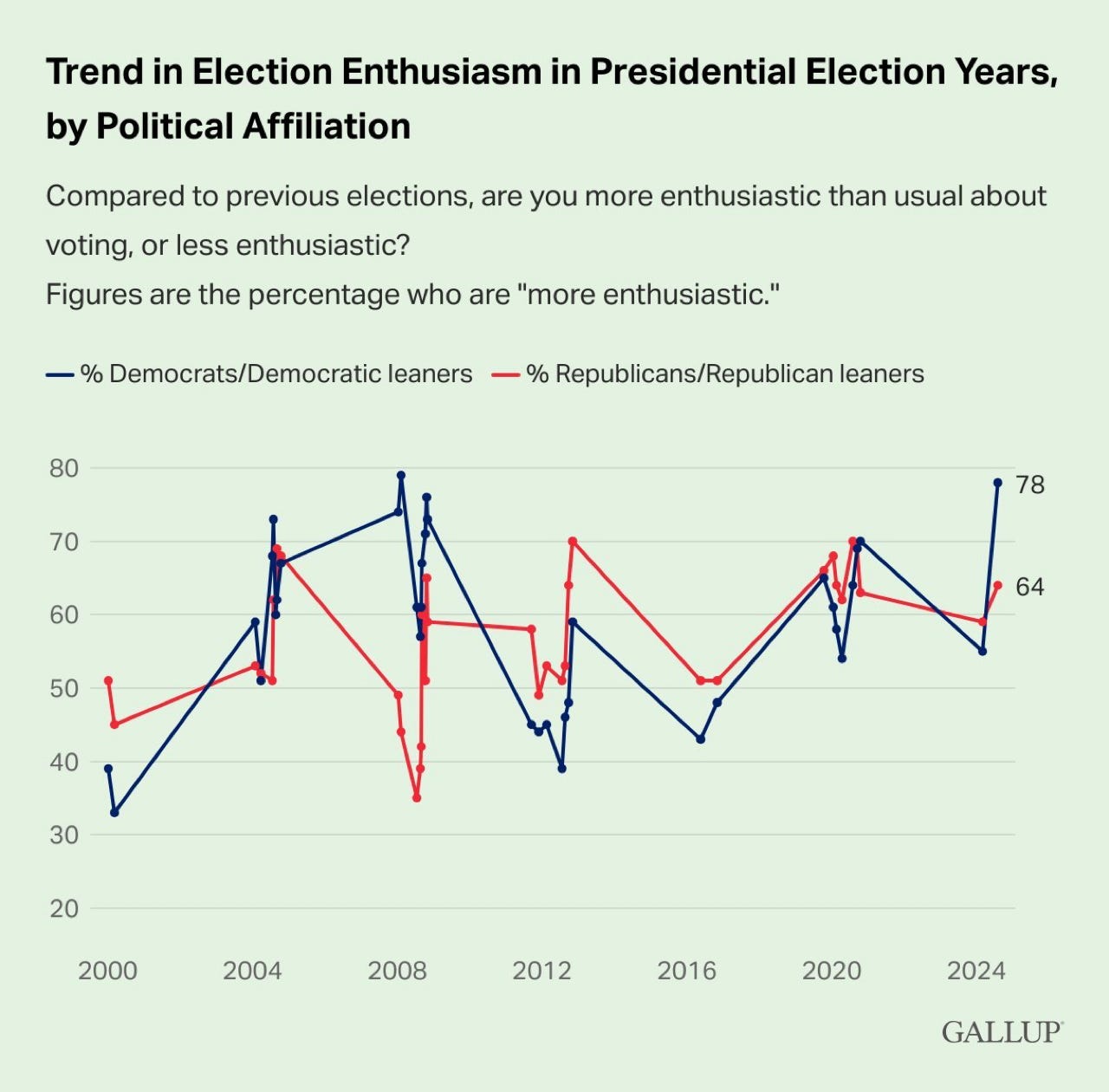
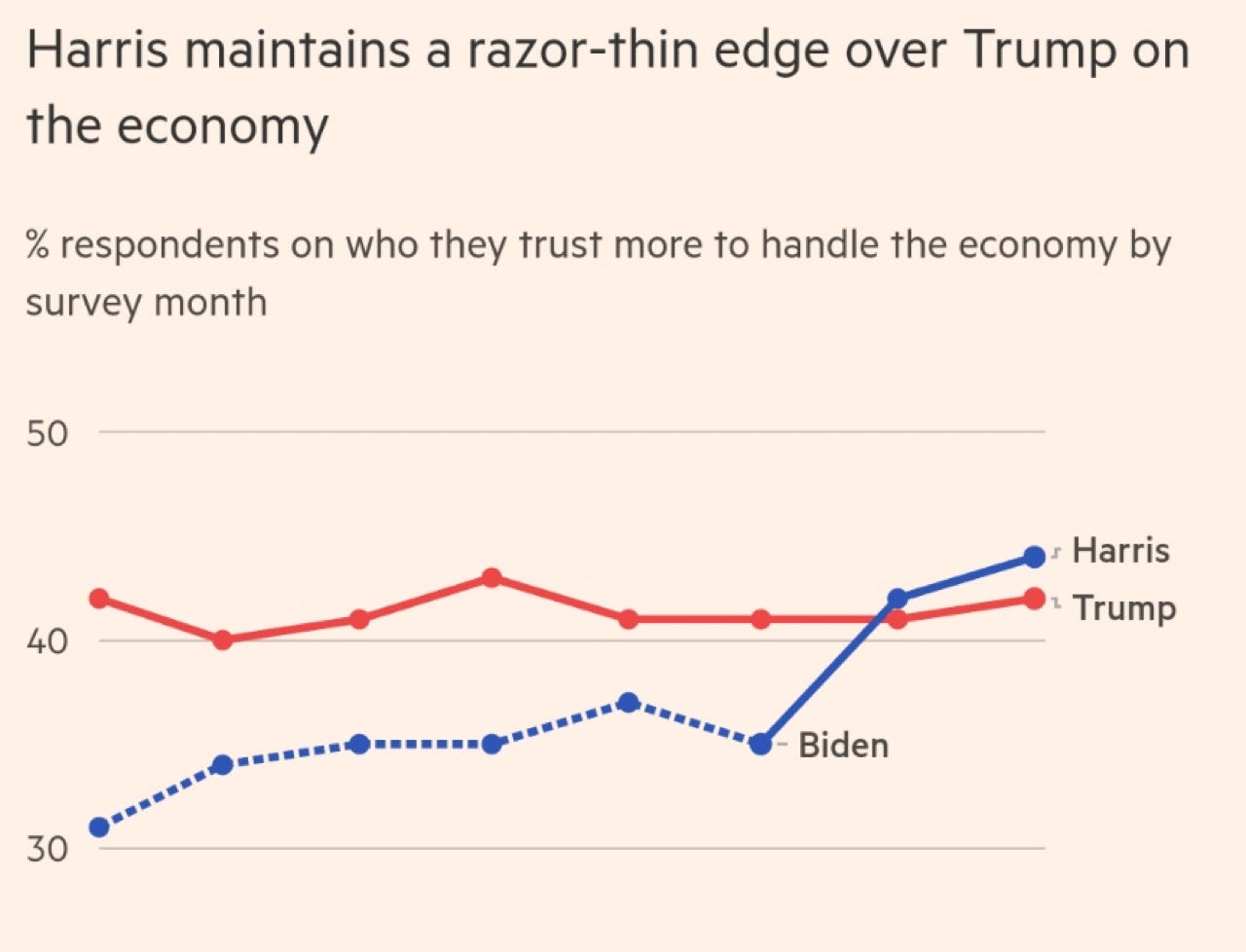
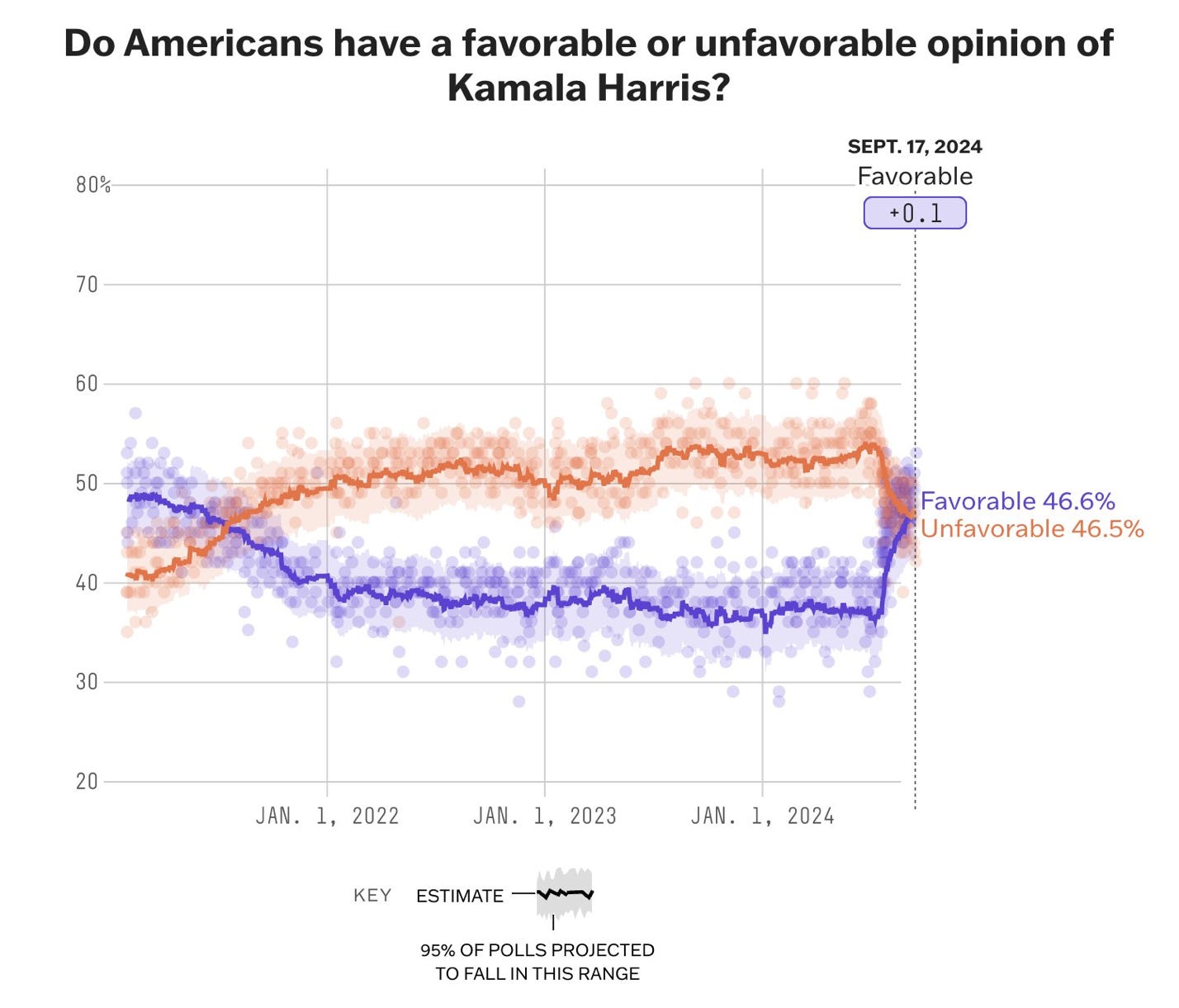
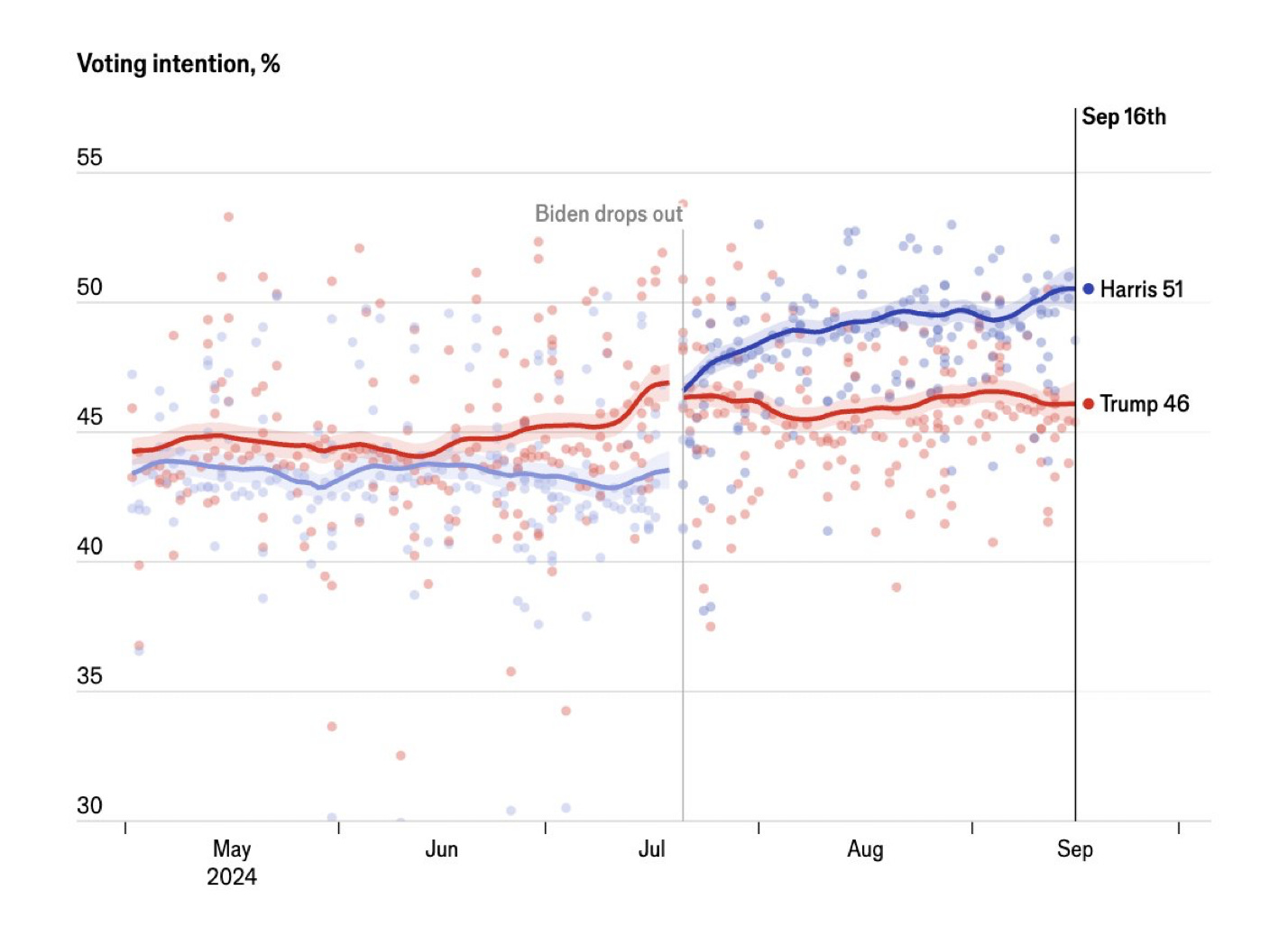
Yes to all of this. I told my 75-year old Mother and 73-year old Aunt on Tuesday night: as long as we keep doing the work of talking to friends and neighbors and community members, asking if they are registered to vote, encouraging them to vote, and doing the hard work of making sure everyone can get to the polls, then we will win. I've been saying for a year now that women will be the difference makers. WE ARE NOT GOING BACK.
"His [Trump's} most solid support came from older white voters in those states, but many of them have since passed away, either from Covid or from other causes." Being a 72 year old Boomer I can also add that women outlive men, and female Boomers remember the days before Roe, and are very pissed off about the Dobbs decision and what's happening to women in Red states with anti-women abortion bans. According to JD Vance, I'm evil (retired university professor), somehow I'm running the country but doing a horrible job of it as a single cat lady, and because my daughter and her partner do not yet have any children I'm also a post-menopausal worthless woman. Female boomers have lived their lives living through sexual assault, sexual discrimination, misogyny and constant insults. We've had enough and we aren't going back.